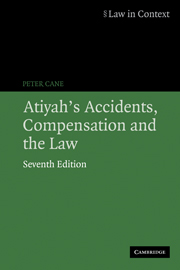Book contents
- Frontmatter
- Contents
- Preface
- List of abbreviations
- List of tables
- Table of legislation
- Table of cases
- Part One The Issues in Perspective
- Part Two The Tort System in Theory
- 2 Fault as a basis of liability
- 3 The scope of the tort of negligence
- 4 Departures from the fault principle
- 5 Causation and remoteness of damage
- 6 Damages for personal injury and death
- 7 An appraisal of the fault principle
- Part Three The Tort System in Operation
- Part Four Other Compensation Systems
- Part Five The Overall Picture
- Part Six The Future
- Index
7 - An appraisal of the fault principle
Published online by Cambridge University Press: 05 June 2012
- Frontmatter
- Contents
- Preface
- List of abbreviations
- List of tables
- Table of legislation
- Table of cases
- Part One The Issues in Perspective
- Part Two The Tort System in Theory
- 2 Fault as a basis of liability
- 3 The scope of the tort of negligence
- 4 Departures from the fault principle
- 5 Causation and remoteness of damage
- 6 Damages for personal injury and death
- 7 An appraisal of the fault principle
- Part Three The Tort System in Operation
- Part Four Other Compensation Systems
- Part Five The Overall Picture
- Part Six The Future
- Index
Summary
The fault principle has traditionally been understood as a principle of morality, which can justify not only the imposition of liability for death and personal injury but also the assessment of compensation according to the full compensation and hundred–per cent principles. Grosser fault may even be seen as justifying the award of exemplary or punitive damages. But in moral terms, the fault principle might be thought to suffer from serious defects. It can also be attacked on social and practical grounds. In this chapter we consider various arguments that might be made against the fault principle as a basis for the payment of compensation to victims of personal injuries by those who inflict them.
The compensation payable bears no relation to the degree of fault
Under the fault principle, being required to pay compensation is a sort of penalty for bad conduct. In the criminal law, it is seen as a basic requirement of justice that ‘the punishment fit the crime’ in terms of the seriousness of both the offender's conduct and the consequences of that conduct. In tort law, on the other hand, there is no such idea that the compensation payable should be proportional to the tortfeasor's fault. Fault is like a magic talisman; once it is established, all shall be given to the injured party. It is generally immaterial whether the fault was gross or trivial1 or whether the consequences of the fault were catastrophic or minor.
- Type
- Chapter
- Information
- Atiyah's Accidents, Compensation and the Law , pp. 175 - 198Publisher: Cambridge University PressPrint publication year: 2006

